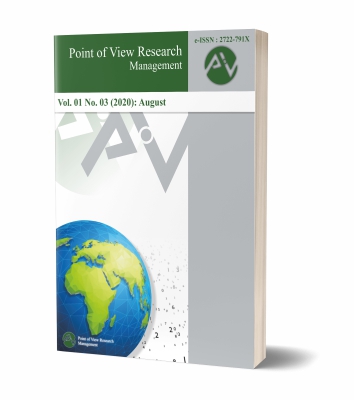Factors that affect employee productivity
Abstract
This study investigates and confirms the effect of the variables of ability, leadership, work discipline, education and training, and incentives on employee productivity. PT. Hanurata Unit-II, a Fakfak Regency involving 70 employees as respondents. Our research data was obtained by distributing online questionnaires. Data were analyzed by the multiple linear regression method through two stages of testing. The first stage is to test the validity and reliability. The second stage is to test the hypothesis. The results of our study illustrate that employee productivity is determined by factors of ability, leadership, work discipline, education and training, and incentives. Ability is a variable that has a dominant influence on the work productivity of PT. Hanurata Unit IIa. So the achievement of employee work productivity so far is mainly determined by the ability of employees.
Downloads
References
Alvesson, M., & Einola, K. (2019). Warning for excessive positivity: Authentic leadership and other traps in leadership studies. The Leadership Quarterly, 30(4), 383-395.
Anshori, M., & Iswati, S. (2019). Metodologi penelitian kuantitatif: edisi 1. Airlangga University Press.
Brewster, C., & Söderström, M. (2017). Human resources and line management 1. In Policy and practice in European human resource management (pp. 51-67). Routledge.
Caliendo, L., Mion, G., Opromolla, L. D., & Rossi-Hansberg, E. (2020). Productivity and organization in Portuguese firms. Journal of Political Economy, 128(11), 4211-4257.
Chaerudin, A. (2018). Manajemen pendidikan dan pelatihan SDM. CV Jejak (Jejak Publisher).
Dieppe, A. (Ed.). (2021). Global Productivity: Trends, Drivers, and Policies. World Bank Publications.
Firman, A., & Ilyas, G. B. (2021). The Effect of Kaizen Strategy on Customer Satisfaction: Empirical Study on Budget Hotels in Makassar City. Point Of View Research Management, 2(1), 01-09.
Gomes, C. F., Yasin, M. M., & Simões, J. M. (2020). The emerging organizational role of the maintenance function: a strategic perspective. Journal of Quality in Maintenance Engineering.
Hajiali, I. (2021). Effect of Information Technology, Training, and Compensation on Employee Work Motivation. Point Of View Research Management, 2(2), 87-93.
Huda, A. M., & Martanti, D. E. (2018). Pengantar manajemen strategik. Jayapangus Press Books, i-329.
Irwan, A., Mahfudnurnajamuddin, M., Nujum, S., & Mangkona, S. (2020). The Effect of Leadership Style, Work Motivation and Organizational Culture on Employee Performance Mediated by Job Satisfaction. International Journal of Multicultural and Multireligious Understanding, 7(8), 642-657.
Kaydos, W. (2020). Operational performance measurement: increasing total productivity. CRC press.
Nasir, M., Megawaty, M., & Pratiwi, D. (2020). Leadership style along with work environment can have considerable influence on employee performance. Point Of View Research Management, 1(3), 48-53.
Nurgiyantoro, B., & Gunawan, M. (2000). Statistik Terapan. Erlangga, Jakarta
Ramdhani, A., Ramdhani, M. A., & Ainissyifa, H. (2017). Conceptual framework of corporate culture influenced on employees commitment to organization. International business management, 11(3), 826-830.
Ravianto, J. (1993). Manajemen Sumber Daya Manusia.
Robbins, S. P., & Judge, T. (2012). Essentials of organizational behavior.
Tan, L., Wang, Y., Qian, W., & Lu, H. (2020). Leader humor and employee job crafting: the role of employee-perceived organizational support and work engagement. Frontiers in Psychology, 11, 2592.
Copyright (c) 2021 Point of View Research Management

This work is licensed under a Creative Commons Attribution 4.0 International License.







